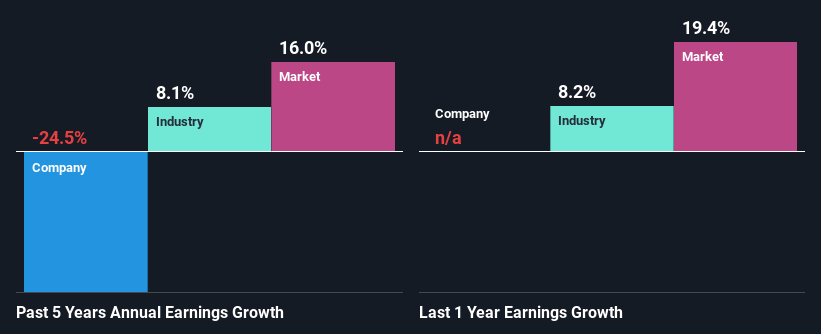[ad_1]
Most readers would already be aware that Pulz Electronics’ (NSE:PULZ) stock increased significantly by 10% over the past week. However, we wonder if the company’s inconsistent financials would have any adverse impact on the current share price momentum. Specifically, we decided to study Pulz Electronics’ ROE in this article.
Return on equity or ROE is a key measure used to assess how efficiently a company’s management is utilizing the company’s capital. In other words, it is a profitability ratio which measures the rate of return on the capital provided by the company’s shareholders.
Our analysis indicates that PULZ is potentially undervalued!
How To Calculate Return On Equity?
The formula for return on equity is:
Return on Equity = Net Profit (from continuing operations) ÷ Shareholders’ Equity
So, based on the above formula, the ROE for Pulz Electronics is:
9.2% = ₹13m ÷ ₹142m (Based on the trailing twelve months to March 2022).
The ‘return’ refers to a company’s earnings over the last year. One way to conceptualize this is that for each ₹1 of shareholders’ capital it has, the company made ₹0.09 in profit.
What Is The Relationship Between ROE And Earnings Growth?
So far, we’ve learned that ROE is a measure of a company’s profitability. Based on how much of its profits the company chooses to reinvest or “retain”, we are then able to evaluate a company’s future ability to generate profits. Assuming all else is equal, companies that have both a higher return on equity and higher profit retention are usually the ones that have a higher growth rate when compared to companies that don’t have the same features.
Pulz Electronics’ Earnings Growth And 9.2% ROE
When you first look at it, Pulz Electronics’ ROE doesn’t look that attractive. However, its ROE is similar to the industry average of 11%, so we won’t completely dismiss the company. Having said that, Pulz Electronics’ five year net income decline rate was 25%. Bear in mind, the company does have a slightly low ROE. Therefore, the decline in earnings could also be the result of this.
That being said, we compared Pulz Electronics’ performance with the industry and were concerned when we found that while the company has shrunk its earnings, the industry has grown its earnings at a rate of 8.1% in the same period.

Earnings growth is an important metric to consider when valuing a stock. The investor should try to establish if the expected growth or decline in earnings, whichever the case may be, is priced in. By doing so, they will have an idea if the stock is headed into clear blue waters or if swampy waters await. If you’re wondering about Pulz Electronics”s valuation, check out this gauge of its price-to-earnings ratio, as compared to its industry.
Is Pulz Electronics Efficiently Re-investing Its Profits?
While the company did payout a portion of its dividend in the past, it currently doesn’t pay a dividend. This implies that potentially all of its profits are being reinvested in the business.
Conclusion
In total, we’re a bit ambivalent about Pulz Electronics’ performance. While the company does have a high rate of reinvestment, the low ROE means that all that reinvestment is not reaping any benefit to its investors, and moreover, its having a negative impact on the earnings growth. Wrapping up, we would proceed with caution with this company and one way of doing that would be to look at the risk profile of the business. To know the 4 risks we have identified for Pulz Electronics visit our risks dashboard for free.
Valuation is complex, but we’re helping make it simple.
Find out whether Pulz Electronics is potentially over or undervalued by checking out our comprehensive analysis, which includes fair value estimates, risks and warnings, dividends, insider transactions and financial health.
View the Free Analysis
Have feedback on this article? Concerned about the content? Get in touch with us directly. Alternatively, email editorial-team (at) simplywallst.com.
This article by Simply Wall St is general in nature. We provide commentary based on historical data and analyst forecasts only using an unbiased methodology and our articles are not intended to be financial advice. It does not constitute a recommendation to buy or sell any stock, and does not take account of your objectives, or your financial situation. We aim to bring you long-term focused analysis driven by fundamental data. Note that our analysis may not factor in the latest price-sensitive company announcements or qualitative material. Simply Wall St has no position in any stocks mentioned.
[ad_2]
Source link








